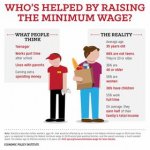"This happens for three reasons. First, higher wages raise demand and this increases profits as well as investments. And new investments, embodying the latest, most productive technologies, in turn raise productivity. Second, growth raises productivity directly, because it makes possible a further deepening of the division of labor and greater learning-by-doing by firms. Third, higher wages induce firms to step up the pace of labor-saving technological progress. The bottom line is that higher wages raise demand, promote technological progress, and increase labor productivity, thereby offsetting at least part (and perhaps all) of the negative impact of higher wages on profits."
How Milton Friedman

""It assumes that workers are responsible for their own employment. If they simply reduce their wage demands, employers will demand their labor services. But the principal determinant of whether workers will be hired is aggregate demand. If there is not enough aggregate demand for goods and services, it matters not how low workers reduce their wage demands: there will be no jobs for them. Ironically, if workers lower their wage demands and earn less, they will have less ability to demand goods and services in the aggregate. Although the standard view holds that prices will fall as wages falls, there are limits to how far those prices can fall given employers’ fixed costs. Moreover, as recent trends in productivity growth show that employers have not shared those gains with their workers, it is questionable as to whether they would really lower prices rather than pocket the labor savings.
The macroeconomic benefits should be fairly straightforward: as higher wages will afford workers greater purchasing power, they in turn will be able to demand more goods and services. As they do this, businesses will produce more, and in turn hire more workers, which may have the inevitable result of bidding up wages across the board. This was the basic macroeconomic argument that underpinned the Fair Labor Standards Act when it was passed in 1938. But because there are wage contour effects, an increase in the minimum wage can be expected to have ripple effects through much of the wage distribution. Therefore, the minimum wage not only benefits those at the bottom of the distribution, but the larger middle class.
This is important because conservatives like to justify their anti-statist approach to economic and social problems on the basis of what benefits the middle class. Of course, they claim that lower taxes will benefit the middle class, as that will effectively give workers more purchasing power. But a minimum wage that benefits the middle class and has the macroeconomic benefit of increasing aggregate demand for goods and services and ultimately more jobs should also lead to lower taxes because more people working should lead to fewer living off the largesse of the state. In other words, the conservative case for the minimum wage rests on the assumption that the positive welfare effects of the minimum wage will lead to less redistribution, which occurs through taxation. Milton Friedman used to argue that redistribution was bad because it infringes individual liberty."
The Conservative Case for the Minimum Wage | EPRN
"As fast food workers strike across the nation, progressives must separate fact from fiction in order to secure a living minimum wage.
Fast food workers are going on strike from New York to Seattle to demand higher wages, highlighting the never-ending controversy over the consequences of raising the minimum wage. Many news stories seem to suggest that economists have decided a higher minimum wage will cause job loss. However, with more analysis, we undercover the truth: there is no clear link between a higher minimum wage and reduced employment.
John Schmitt, a Senior Economist at the Center for Economic and Policy Research, reported in February 2013 that multiple meta-studies (studies that use statistical techniques to analyze a large amount of separate studies) found that for both older and current studies alike, there is no statistical significance in the effect of an increased minimum wage. Put plainly, if the effect is not statistically significant, then there is no proven effect— increases in the minimum wage do not cause job loss.
Accordingly, a few weeks ago, over 100 economists at organizations ranging from the Center for American Progress to Boston University signed a petition in support of increasing the minimum wage. They present current research from well-established organizations such as the National Bureau of Economic Research that shows there are no negative employment effects from minimum wage increases. This includes the most comprehensive data available, based on the increasingly accurate testing that has occurred as more and more states increase minimum wage levels. Even more importantly, this recent series of studies use cutting-edge econometric techniques to control for extraneous variables such as economic downturns and geographic effects. When economists do that, they find that minimum wage increases do not reduce employment.
Logically, this makes a lot of sense. A higher minimum wage is a win-win situation economically: employees have more money to be consumers and are more productive, while businesses wind up reducing costs in the long run, since they won’t have to spend as much money hiring and training new workers (by analyzing data from five separate studies, economists representing the Political Economy Research Institute found that McDonald's could easily make up for the costs of a higher minimum wage with a mere five cent price increase on Big Macs). It’s just as Henry Ford realized—when he paid his workers more, they became part of his customer base, making his company even more profitable. Increasing the customer base and expanding customer pockets helps stimulate the entire economy, badly needed in the current recession.
So if we have no evidence linking high wages to job loss, our next question is: are higher wages needed as a poverty reduction tool?
Currently, the 2013 Federal Poverty guidelines stipulate $23,550 for a family of four as poverty level. A $7.25 minimum wage currently nets the protesting fast food workers $15,080 a year if the workers are lucky enough to work 40 hours a week. In a typical household with two parents and two children, parents who make $7.25 earn far below the living wage of $13.55, according to an MIT wage calculator. The numbers become even starker when you separate out true living expenses: food, medical care, housing, transportation, and other needed expenses add up to a required $37,540 annual income before taxes, which is notably different than the poverty guidelines that the U.S. Department of Health & Human Services set. Even if the two parents worked 40 hours a week for 52 weeks, they would only earn $30,160 in total, significantly below the resources they need to live. Moreover, these estimates are only for a typical nuclear family. The struggle that single-income families, large families, or families living in high-cost cities go through is exponentially higher.
The buying power of minimum wage has steadily been waning due to the effects of inflation for the past 40 years. When prices increase, a worker’s paycheck buys less and less. To put it in perspective, we look to another brief by John Schmitt: if minimum wage had continued to match productivity growth, it would have been $21.72 per hour in 2012. If we only adjust for the cost of living, a minimum wage pegged to inflation would be $10.52.
A huge bulk of evidence makes the case that increasing the minimum wage is a doable, efficient, and necessary change for the economy. This change needs to happen now. We as Americans have a moral obligation to make sure that other Americans who are working hard to support themselves and their families are able to make a living."
Debunking the Minimum Wage Myth: Higher Wages Will Not Reduce Jobs | Next New Deal

